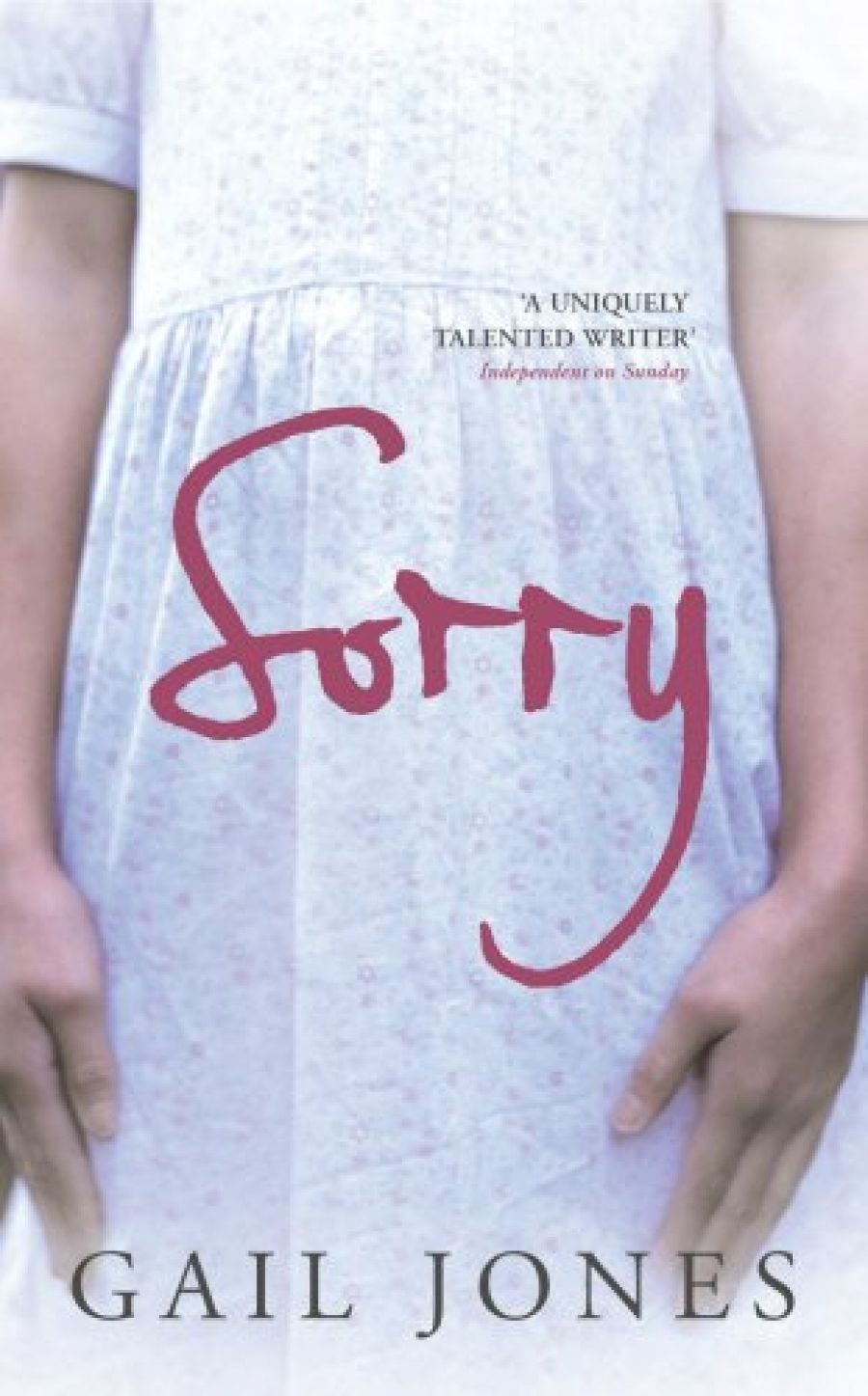
- Free Article: No
- Contents Category: Fiction
- Review Article: Yes
- Online Only: No
- Custom Highlight Text:
A smattering of cultural theory is helpful when reading Gail Jones. The academic bones of her writing always show through the thin padding of her concept-driven stories: deconstructed photography in Sixty Lights (2005), technology and intimacy entwined in Dreams of Speaking (2006). It is more than disconcerting when the narrator of Jones’s third novel, Sorry, starts to interrogate the text with the aplomb of a Cultural Studies postgraduate, especially as the said narrator, Perdita, is a twelve-year-old girl living in Perth, in 1942, curled up in bed with a copy of Joseph Conrad’s Heart of Darkness. ‘Since the first reader is the author,’ Perdita thinks to herself, ‘might there be a channel, somehow, between author and reader, an indefinable intimacy, a secret pact? There are always moments, reading a novel, in which one recognises oneself, or comes across a described detail especially and personally redolent; might there be in this covert world, yet another zone of connection?’
- Book 1 Title: Sorry
- Book 1 Biblio: Harvill Secker, $32.95 pb, 217 pp
- Book 1 Readings Link: booktopia.kh4ffx.net/P1AEe
Perhaps. But there are also moments, reading a novel, when one’s ability to suspend disbelief is undermined by passages as unlikely and anachronistic as this. We know, because we are told more than once, that Perdita is exceptionally intelligent, but this string of thoughts is more than precocious.
You either buy into it or you don’t. This is a novel of ambitious seriousness, with serious ambitions, some of which are achieved. Regardless of her academic bent, as a novelist Jones excels at structure: everything happens in this book for a reason, and its four parts fit together beautifully, meshing ideas about history, speech, reading, memory and family.
Jones may allude to these satisfactions in a late scene in the book where a kindly but minor character teaches the narrator basic carpentry:
Ted taught Perdita how to make a small wooden box; he showed her how to saw, to nail, to create dove-tailed corners. ‘Tricky’ seemed to be his favourite word. ‘This bit is tricky,’ he would say, and shyly smile, and Perdita felt a sense of achievement when she completed a tricky task, when she sanded her box, rubbed it clean and varnished it to shine.
Jones likes tricky bits, too. The overarching themes are Australia’s most difficult: the dispossession of indigenous Australians, and the call to make amends. Even the book’s bald title echoes statements as simple as the T-shirts Midnight Oil wore at the closing ceremony of the Sydney Olympics, but it adds all sorts of layers to the message.
Sorry takes place in Western Australia in the early 1940s, once Part One has established the characters’ histories. Perdita’s father, Nicholas, is an anthropologist who has been hired by the Chief Protector of Aborigines to study tribes near Broome: ‘his field-work projects would be useful in the governance of natives.’ Perdita’s mother, Stella, is a classic hysteric, waking in fright each morning on the cattle station, clinging to her reams of memorised Shakespeare as if to a cable that might drag her back to civilised London spinsterhood.
Stella names her daughter after the abandoned child in The Winter’s Tale and, in the throes of post-natal depression, promptly follows suit, rejecting the baby. Like one of Shakespeare’s many foundlings, Perdita is not raised by her unloving mother. Instead, she is nurtured by the station’s black population.
Nicholas is the bad white male incarnate, vain, stupid and brutish. This does not make him improbable, but it does make him uninteresting, and it is wearying to have his two-bit impulses laid out for us so neatly: ‘All the white men did it; he felt manly and justified … Nicholas likes to pull her head back by its tangled hair and feel that he penetrated so that he hurt her.’ Nicholas comes to a bad end, in dramatic and deliberately confusing scenes that set the second half of the book in motion.
Stella is more satisfying: phobic, ferocious and just as mad as Mrs Rochester. By the end of the book, as with Perdita, you cannot help but feel fond of this terrible woman, who mixes Shakespearean monologues with the book’s few examples of straight talk.
Then there is the half-caste Aboriginal girl, Mary, whose solicitous affection for Perdita goes far beyond her helpmate brief. Like Perdita, she becomes extremely intelligent, and intuitively au fait with literary theory. Add to that her native wisdom, her grasp of Aboriginal philosophies and dreamings, and you get someone who functions more as an enchanted spirit than a human. She suffers terribly in the book, but always radiates calm, love and generosity.
It is the kind of book where all the outsiders are wise and insightful in ways far advanced for their times and their years. Perdita and her deaf-mute, ginger-headed friend Billy are the only white folk welcomed into the local Aboriginal clans, given skin names, taught the ways of the desert. ‘“Whitefellas can’t see nothin’ around them; whitefellas all buggered up in the head,” Mary declared, touching her temple. “’Cept you two, of course,” she added with a broad grin.’
Of course.
I am not suggesting that white children have never learned the ways of local tribes, but I did chafe when protagonists escape the prejudices of their time, as in Sena Jeter’s Ahab’s Wife (2005), where the missus thinks killing whales is bad and when will she get the vote, a job and a book deal, or something like that.
Perdita’s compassion and enthusiasm for Aboriginal culture is as avant-garde as her questions about the author and the text. Why is it that Aboriginal memoirs of the same era, such as Doris Pilkington Garimara’s Rabbit-Proof Fence (1996), scarcely mention such wise white children? Everything is fair within the bounds of fiction, but a narrator this preternaturally right-on feels like cheating.


Comments powered by CComment